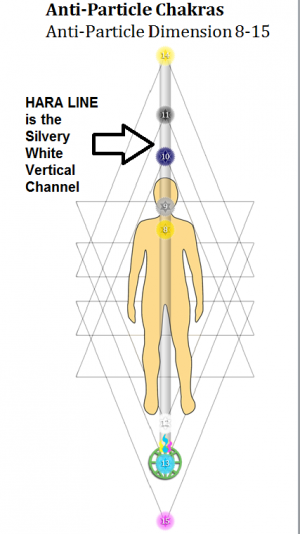Hara Line
Main vertical spiritual current column (also called the sushuma). It runs up the center of the body. This is related to the formation of the 1st of the 1st Eight Cells of the Spirit Body in the Tailbone. It is where the Hara Currents come from. And before the Hara Currents we have the Core Currents that come from the Eye of God.[1]
- White spiral: Pingala nadi, solar principle
- Dark spiral: Ida nadi, lunar principle
- Vertical Central line: sushumna nadi, neutral
Hara Center
The Hara Center is located at the navel, about two inches inwards from the skin. It is the gateway into the etheric envelope surrounding the planet. The Hara Center is the center of the etheric body where the Monad seats itself. It is about an inch in diameter and is the gateway into the ocean of life force or chi. Around the Hara Center and with it as the center there is an envelope of energy called the ‘tan tien’ or Dantien. This tan tien or dantien is a ball of etheric energy about the size of a soccer ball. It is filled from the Hara Line.
Rebuilding Pranic Tube in Hara Line
For those of us on the ascension pathway we are undergoing shifts in the architecture of our Violet Ray flame, crown chakra and our pranic tube. The prana tube runs the movement of our breath in the same direction with the central vertical channel of which our chakra cones attach at their center. Our chakras are very much designed like circular flower petals with seed crystals in its center. The crystal seed of our chakra flower is attached to the central vertical channel and the “prana”, the breath of life, runs in circular patterns throughout our vertical channel and our chakras when we are healthy and in energetic balance. When we focus on our breath through meditation we can redirect the life force in the prana tube to circulate in the central channel and vitalize these energy centers. One of the most effective ways to balance the breath through both the right and left channels of the brain center, sinus, and nasal passages is through “pranayama”alternate nostril breathing.[2]
Clear Blockages
Moving blockages from the lower energy centers and emphasis on clearing the astral body and its centers generally can bring significant relief. Focus your mind upon the natural movement of the kundalini, which starts in the back tailbone ( male principle), moves up the spine, past the neck, stops at the top lip and changes polarity moving down the front of the body ( female principle) from the top lip to the tailbone. This circular movement of energy is the “microcosmic orbit”, of which all life force moves in our central column or hara line. By focusing your mind gently in meditation on its natural circular movement , intend to move and clear blockages as you strengthen the inner pathway of the life force flow. [3]
Microcosmic Orbit
Practicing the Microcosmic Orbit Scanning procedure starts with breathing and focusing on the Tailbone, slowly running up the back of the spine and down the front channel, while looking for or sensing energetic weakness. When energetic weakness is found, intend to correct weakness and use mental focus to say, “Correct nadial control panel” or “correct nadial complex”. The Microcosmic orbit is the circular energetic flow moving up the spine which completes a moving circuit at the perineum. Because the spine and spinal nerves, CNS are the main control factor of every function in the body, this exercise is suggested to strengthen the energy moving in the center channel. Practice scanning for energetic weaknesses and focusing upon the main central channel, following the micro cosmic orbit path on the main energy channels, to complete and strengthen the internal energy circuit, place the tip of the tongue on the upper palate while continuing to focus on strengthening the circular movement in the main channel.
References
See Also
Term found in HGS Manual: Page 24/66
